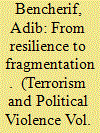| Srl | Item |
| 1 |
ID:
172172


|
|
|
|
|
| Summary/Abstract |
During the last decade, Al Qaeda in the Islamic Maghreb (AQIM) managed to survive despite suffering four major fragmentations. Through the case study of AQIM, the goal of this paper is to contribute theoretically and empirically to the literature on terrorism by explaining the fragmentation of resilient jihadist groups. Two causes of fragmentation are identified: the “preference divergence,” in reference to the works of Shapiro, and the structural organization of power. Furthermore, two notions are presented to refine the theoretical tools of the literature on terrorism: a) the meta-strategy of survival, and b) centralized and deconcentrated power. To explore the group’s history and demonstrate the modularity of AQIM, a triangulation of primary sources, such as internal documents and key interviews, along with the monitoring of the regional press, is utilized. The author concludes this paper by suggesting new avenues for studying the evolution of jihadist groups.
|
|
|
|
|
|
|
|
|
|
|
|
|
|
|
|
| 2 |
ID:
191469


|
|
|
|
|
| Summary/Abstract |
This article discusses the trends and micro-dynamics of violence in northern Mali. Using a mixed research design, we focus on the violence used by jihadist groups during the first phases of the Malian civil war (2012–2015). Integrating research on civil war and terrorism, we distinguish between direct and remote violence. Quantitative analyses show that the involvement of jihadist groups in this conflict had a strong impact on the level and intensity of violence of all warring parties. Qualitative analysis of data collected during field research done in Mali between 2016 and 2017 complements the quantitative work. It enlightens that relational dynamics strongly influence the decision to resort to violence within non-state armed groups, including jihadist ones, while local contexts often explain temporal and geographic variations in violence.
|
|
|
|
|
|
|
|
|
|
|
|
|
|
|
|
| 3 |
ID:
193878


|
|
|
|
|
| Summary/Abstract |
Jihadist groups have found a ‘safe haven’ in northern Mali. They have managed this by operating strategically to establish themselves and to develop relationships with local communities, but characteristics of the environment have also facilitated their development and survival. In northern Mali, the political landscape is fragmented, and replete with competition between the central authority and various groups of local elites, who are themselves divided. I conceptualise this fluid environment as a context that incentivises ‘political nomadism’. Using the Tuareg communities as an entry point, I explore the complex dynamics between local and national political actors and jihadist groups in northern Mali. I argue that the jihadist ‘safe haven’ in northern Mali is highly relational and has been facilitated by the form of political nomadism practiced in the region since the 1990s. The article is based on eight months of fieldwork conducted between 2016 and 2017 in Mali and Niger.
|
|
|
|
|
|
|
|
|
|
|
|
|
|
|
|